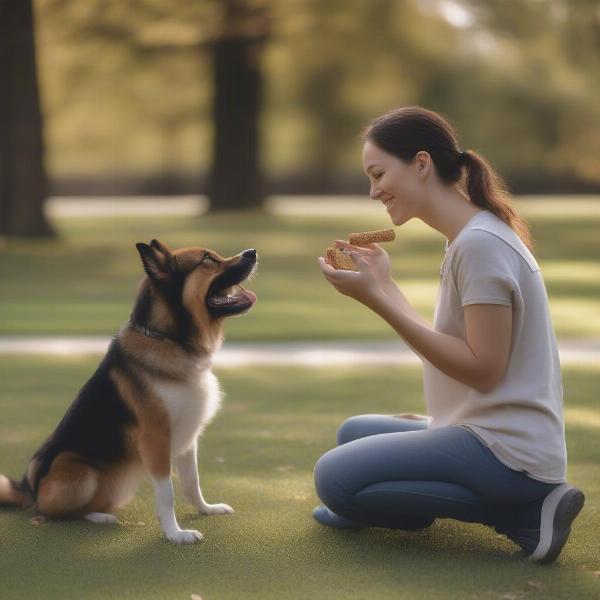“Curb your dog” is a phrase you’ll often hear, especially in urban environments. It essentially means to control your dog’s behavior in public spaces, ensuring they don’t pose a nuisance or danger to others. This encompasses everything from preventing excessive barking and jumping to properly managing waste disposal and keeping your dog on a leash. This article will delve deeper into the meaning of “curb your dog,” offering practical tips for responsible dog ownership and ensuring a harmonious environment for everyone.
What Does “Curb Your Dog” Really Mean?
Beyond the literal interpretation of restraining your dog, “curb your dog” speaks to a broader concept of responsible pet ownership. It’s about being considerate of your surroundings and taking proactive steps to prevent your dog from causing disruption or harm. This involves understanding your dog’s behavior, training them effectively, and adhering to local regulations. It also means being prepared for unexpected situations and taking responsibility for your dog’s actions.
Leash Laws and Local Regulations
One of the most fundamental aspects of curbing your dog is adhering to leash laws. These regulations vary by location, but generally require dogs to be on a leash when in public spaces. This not only prevents dogs from running off and potentially getting lost or injured but also protects others from unwanted interactions, especially those who may be fearful of dogs. Check your local ordinances to understand specific leash requirements in your area.
Managing Barking and Noise
Excessive barking can be a significant nuisance, disturbing neighbors and creating tension within a community. “Curbing your dog” in this context means addressing the underlying causes of barking and implementing strategies to manage it effectively. This might involve training, environmental enrichment, or even seeking professional guidance from a certified dog trainer or behaviorist.
Proper Waste Disposal
Another key component of curbing your dog involves responsible waste management. Always carry bags and promptly pick up after your dog, disposing of the waste in designated receptacles. Failing to do so not only creates an unsanitary environment but also reflects poorly on dog owners as a whole. This simple act of responsibility contributes significantly to maintaining clean and pleasant public spaces.
Socialization and Training
A well-socialized and trained dog is less likely to cause problems in public. Early socialization exposes puppies to various sights, sounds, and experiences, helping them develop into confident and well-adjusted adults. Ongoing training reinforces good behavior and teaches dogs to respond appropriately to commands, making them easier to manage in different situations.
 Dog Training with Treats
Dog Training with Treats
Conclusion
Curbing your dog is about more than just physical restraint. It’s about being a responsible pet owner who prioritizes the well-being of their dog and the community. By understanding your dog’s needs, providing proper training, and adhering to local regulations, you can ensure a harmonious coexistence between dogs and people.
FAQ
-
What if my dog doesn’t respond well to training? Consider seeking professional guidance from a certified dog trainer or behaviorist.
-
Are there exemptions to leash laws? Some areas may have designated off-leash dog parks or areas. Check your local regulations.
-
What are the consequences of not curbing my dog? Penalties can range from fines to legal action, depending on the severity of the infraction.
-
How can I socialize my dog during the pandemic? Consult with a veterinarian or trainer for safe and effective socialization strategies.
-
What are some tips for managing a dog that barks excessively? Identify the triggers for barking and address them through training, environmental enrichment, or other appropriate methods.
Related Articles on ILM Dog
ILM Dog is your global resource for expert advice on dog care and nurturing. We offer practical guidance on everything from breed selection and healthcare to training, nutrition, and grooming. Whether you’re a first-time dog owner or a seasoned expert, ILM Dog provides the information you need to ensure a happy, healthy life for your canine companion. Contact us at [email protected] or +44 20-3965-8624 for personalized support. For more information on our services and expert advice, visit ILM Dog.